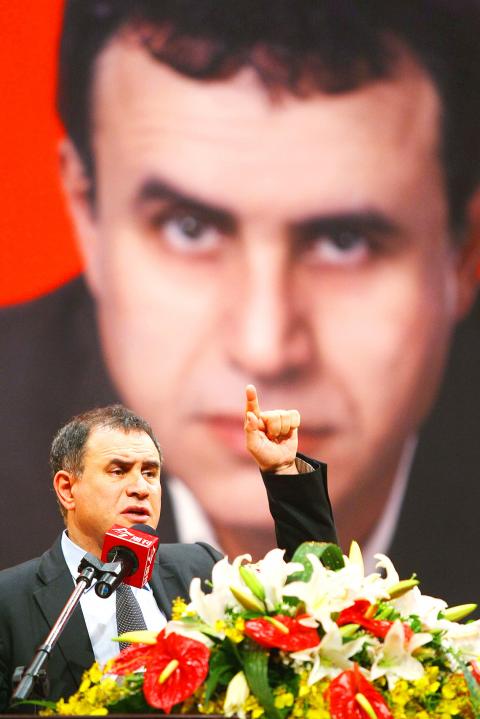Massive capital inflows pose the biggest challenge to emerging economies, including Taiwan’s, because in recent months their currencies have strengthened against the US dollar and the competitiveness of their exports could be jeopardized if the trend continues unchecked, US economist Nouriel Roubini said yesterday in Taipei.
Roubini, an economics professor at New York Unviersity and dubbed “Dr Doom” for his pessimistic forecasts, said that while emerging economies in Asia have stronger economic fundamentals than other countries, uncertainties remain about their overall economic outlook.
THWARTED HOPES

Photo: CNA
The renowned economist cited asset bubbles, China’s potential overheating economy and regional central banks’ policy responses as possible risks that may thwart hopes of a V-shaped recovery.
“How to manage massive capital inflows is the biggest challenge for central banks in the region,” Roubini said during a speech organized by the Chinese-language Business Today (今周刊) weekly.
If left unaddressed, currencies in export-driven economies such as Taiwan and other Asian countries will gain value, driven by an influx of global funds to exploit their economic growth and higher yields, he said.
This trend is evident after the US announced a second round of quantitative easing to avoid a double-dip recession, Roubini said, adding that to achieve this goal, the US Federal Reserve may inject more liquidity into the market and Europe may take similar steps.
‘CONSUME LESS’
“Advanced economies will have to spend less, consume less, import less and save more for years to put the economy back on track,” he said. “The monetary easing came after inflation readings stood below the central bank’s target.”
Roubini said the policy stance is necessary from a global perspective because the East has not fully decoupled its economic dependence from the West, although the level of reliance has eased.
This interdependence explained why Europe’s debt problems prompted corrections in stock markets across the world earlier this year, he said.
EUROZONE CONCERN
Regarding the current debt crisis in Europe, Roubini said there was a risk of the problem spreading to Portugal and Spain. The rising budget deficits in the eurozone are a concern, he added.
“There’s now financial contagion in Portugal, Spain and to a smaller degree even in countries like Italy, Belgium and others in the eurozone,” Roubini said.
Addressing the issue of capital inflows, he said currency intervention without interest rate hikes may increase bubble pressures as central banks pump more money into the market to support the US dollar.
Stabilizing intervention, or intervention measures that were used to stabilize exchange rates, have led to more inflows of hot money, Roubini said.
Taiwan recently tightened rules governing purchases of government debts by foreign investors to curb hot money inflows.
DIVERSIFY
Roubini said an open economy coupled with sound fundamentals is the best way to absorb external shocks. He advised investors to maintain a diversified portfolio across regions to lower investment risks.
Taiwan Semiconductor Manufacturing Co (TSMC, 台積電) chairman Morris Chang (張忠謀), who joined a panel discussion following Roubini’s speech, said he hoped the central bank would ensure that any appreciation in the local currency would be gradual.
Exporters could cope with slower appreciation more easily than a sudden rise, Chang said. TSMC is the world’s largest contract chipmaker.
Additional reporting by Bloomberg

In Italy’s storied gold-making hubs, jewelers are reworking their designs to trim gold content as they race to blunt the effect of record prices and appeal to shoppers watching their budgets. Gold prices hit a record high on Thursday, surging near US$5,600 an ounce, more than double a year ago as geopolitical concerns and jitters over trade pushed investors toward the safe-haven asset. The rally is putting undue pressure on small artisans as they face mounting demands from customers, including international brands, to produce cheaper items, from signature pieces to wedding rings, according to interviews with four independent jewelers in Italy’s main

Japanese Prime Minister Sanae Takaichi has talked up the benefits of a weaker yen in a campaign speech, adopting a tone at odds with her finance ministry, which has refused to rule out any options to counter excessive foreign exchange volatility. Takaichi later softened her stance, saying she did not have a preference for the yen’s direction. “People say the weak yen is bad right now, but for export industries, it’s a major opportunity,” Takaichi said on Saturday at a rally for Liberal Democratic Party candidate Daishiro Yamagiwa in Kanagawa Prefecture ahead of a snap election on Sunday. “Whether it’s selling food or

CONCERNS: Tech companies investing in AI businesses that purchase their products have raised questions among investors that they are artificially propping up demand Nvidia Corp chief executive officer Jensen Huang (黃仁勳) on Saturday said that the company would be participating in OpenAI’s latest funding round, describing it as potentially “the largest investment we’ve ever made.” “We will invest a great deal of money,” Huang told reporters while visiting Taipei. “I believe in OpenAI. The work that they do is incredible. They’re one of the most consequential companies of our time.” Huang did not say exactly how much Nvidia might contribute, but described the investment as “huge.” “Let Sam announce how much he’s going to raise — it’s for him to decide,” Huang said, referring to OpenAI

The global server market is expected to grow 12.8 percent annually this year, with artificial intelligence (AI) servers projected to account for 16.5 percent, driven by continued investment in AI infrastructure by major cloud service providers (CSPs), market researcher TrendForce Corp (集邦科技) said yesterday. Global AI server shipments this year are expected to increase 28 percent year-on-year to more than 2.7 million units, driven by sustained demand from CSPs and government sovereign cloud projects, TrendForce analyst Frank Kung (龔明德) told the Taipei Times. Demand for GPU-based AI servers, including Nvidia Corp’s GB and Vera Rubin rack systems, is expected to remain high,